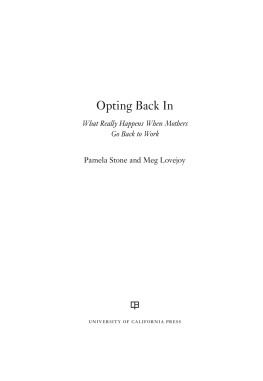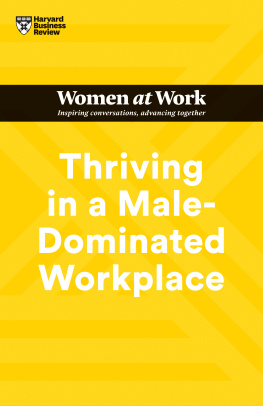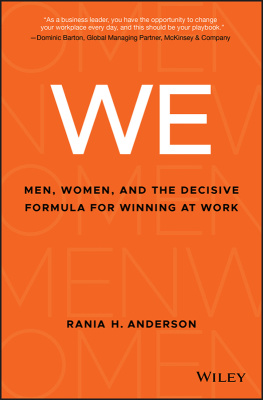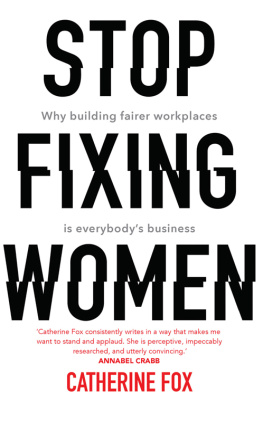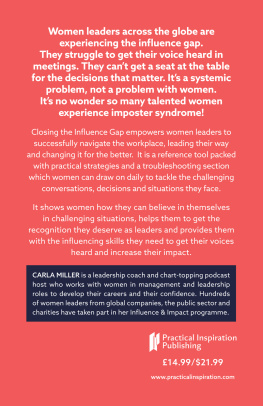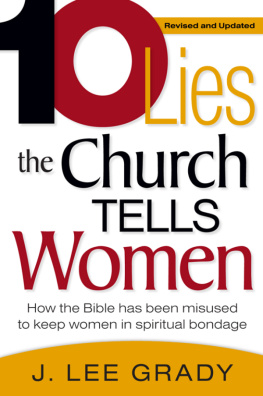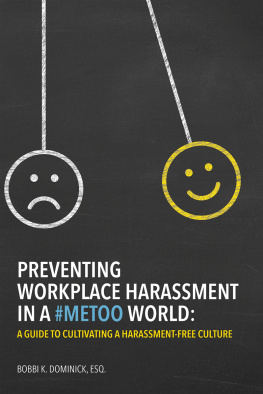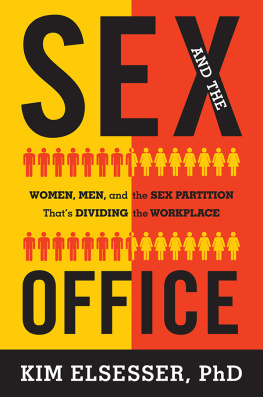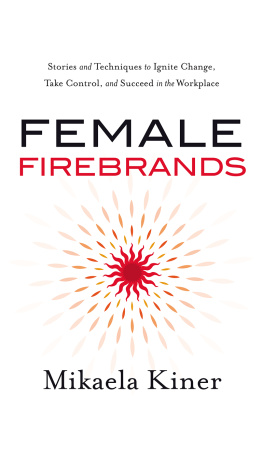Table of Contents
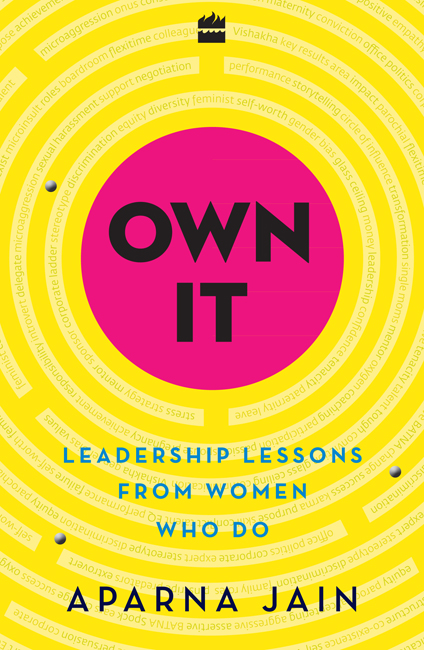
OWN
IT
LEADERSHIP LESSONS
FROM WOMEN
WHO DO
APARNA JAIN

For Aradhana and Arianna,
For whom I hope the world will be a more equitable place
and
For Adianta, Adrish and Kaivalya, who will help make it that way
Contents
In retrospect, the first time I became aware of a feeling that had some tiny elements of what some people would call feminism was when my baby brother and I were taken to visit my paternal grandfather in Old Delhi. I didnt know the meaning of the word then, but the feeling had something to do with being discriminated against, and my mind summed it up in two words: Not fair!
My grandfather was old school, conservative and cold. I remember being on guarded behaviour during these strange visits to his place, spent mostly trying to figure out what games could be played around the perilously grated iron flooring on the top-floor courtyard. At the end of the visit, he would benevolently slip my brother a 100-rupee note and me a measly five rupees. I was barely six; what could I say to the grand patriarch except fold my hands in a polite namaste and thank him. Later, as though to set things right, I would simply take away my brothers loot and put it in my piggy bank. There, thats fair! Hes only a baby after all.
The monetary angle notwithstanding, I did not look forward to these visits as there was an overwhelming sense of being discriminated against. My mother somehow knew and once we were downstairs, after taking leave of my grandfather, she would simply take the five rupees from me and give me a 100-rupee note from her own money. Having grown up among five brothers and an equal number of sisters, things were relatively more equitable in her family. My nanaji kept up with the times and was free from the trappings of tradition. He would quietly pull out churan and ampapad from the hidden recesses of his cupboard and slip them to me when my nani was not looking. Thankfully, I grew up with that side of the family having a strong influence on my life.
How did this book come about? Well, the idea took root during an evening with friends at a hotel lounge. I had recently published a cookbook, The Sood Family Cookbook (my mothers side of family, mind you) and the conversation started to veer towards my next book. Karthika, Rajiv and I spoke on issues that were important to us and brainstormed ideas over Barolo. I would write about women; women in the corporate world. None of the usual suspects, I said. I want to go a rung or two below the CEO level; women who will tell me how they got to where they are, the challenges they face in the corporate world women not under obligation to give me media speak; women who have figured out how to steer their way through the system.
We all reached an agreement, and more Italian red wine was poured.
It took time appointments, cancelled appointments, mixed-up appointments. I met women from all industries across five cities, some men too. My friends in the media helped, as did my clients in the corporate world. Women I interviewed put me on to other women. Life was a bit of a blur at times, as were the stories. Over a year I met and interviewed 190 women in senior leadership positions in Delhi, Gurgaon, Mumbai, Bangalore, Pune and Chennai. Ninety-five per cent of these meetings were face to face, without a set questionnaire, and that made all the difference. It gave me richer data, also access to stories/incidents I did not know could impact womens careers so profoundly. It gave me insights into deeply personal matters involving both home and family.
I wrote to HR heads from top ten Indian companies, seeking information relevant to the book. Some responded, most did not. I spoke with and wrote to subject experts from around the world to get the necessary inputs. They all wrote back within a week. An interesting fact: Of the men I wrote to in India, 80 per cent did not respond, not even an acknowledgement email. Of the women, 94 per cent responded, and I met 97 per cent of those I had written to.
Many names have been changed, very few women spoke on record for fear of repercussions vis--vis their careers. They felt their stories were important, needed to be told and if they could somehow reach out to other women and make them feel they were not alone, they were happy to talk. That they were worried about the repercussions, about being judged, about gag orders from their companies, and therefore used fake names tells its own stories, as does the fact that a few of them called me up the next day to ask for their accounts to be retracted. Nonetheless, the stories kept coming in.
In July 2014, the Internet was abuzz with interview transcripts from the Aspen Ideas festival where PepsiCo CEO Indra Nooyi spoke about work-life balance and whether women can have it all, commenting on a question that alluded to Anne-Marie Slaughters Why Women Still Cant Have It All.
Her response was candid: I dont think women can have it all. I just dont think so. We pretend we have it all. We pretend we can have it all. She spoke about the tug-of-war between her role as a corporate doyen and her role as a mother, wife and daughter. And the choices she made.
Her voice found resonance in the corporate world, particularly among women executives who felt the same, whose sentiments had been validated.
Then there were those who scoffed: Should we want it all? Who has it all? Even men dont have it all. We kill ourselves wanting it all!
On the final lap to finishing the book, a long chat with Nilanjana (Buju) Dasgupta (professor of psychological & brain studies at University of Massachusetts) helped me realize how I needed to frame the stories and anecdotes to make them powerful and relevant to women.
I often had to keep my own feelings under check during the writing of this book: my feelings of anger, sadness and helplessness at the fact that many women I spoke to had come to terms with the lives that had been dished out to them lives that required them to be on call between home and work almost 24x7. My own biases often crept up. I had to read, edit, re-edit some lines time and again, because I could see myself showing up all over.
What I loved about writing this book?
I met brilliant people.
I forged new friendships.
I learned a lot.
I heard stories that shocked, and thats unusual.
I was able to help a few.
Many women called me back, days after our initial talk, only to say I had got them thinking that they had some rude awakenings about the shit they take. Some had already taken steps to bring change and some called me for input.
What I learnt in the process of writing this?
Every woman has the power; but we need to support each other along with the will.
The more senior the women in the workplace, the more vulnerable they feel.
We need to stick together to deliver a more equitable future for generations.
If you can be a more supportive and open woman, who supports other women in your family, no matter what the relationships are like now, you will own that change.
If you can be a stronger mother, who can teach sons to respect women, to behave better, to cook, clean and help in traditional women roles; and if you can teach your daughters to be brave and fearless, to stand up and stand out, you will own that change.
If you can stand up against the everyday patriarchy, shun rituals and sexist constructs, you will own that change.
If you can mentor even five women in your career, you will own that change.



